First week of Feeding our Future trial not so good for Aimee Bock...
In addition, some testimony from MDE was a little head-scratching
In my trial coverage, I sometimes refer to “courtroom moments” — which could be a bit of testimony, an outburst, an unpredicted answer, or an ill-advised question — that doesn’t necessarily decide the case but becomes imprinted on the minds of the jury.
One of those moments in the trial of Aimee Bock, the former executive director of Feeding our Future, happened on Tuesday, as reported by my colleague Gordon Severson. This trial is the “main event” of the largest pandemic fraud case in the United States.
Lul Ali, who has already pleaded guilty to her role in the $250 million dollar pandemic fraud case, was on the witness stand. While being questioned, Ali began to cry, gestured to Bock and said, “She destroyed us (Somalis) as a community.”
The judge needed to call for a brief recess for Ali to compose herself.
While Ali herself has a less than sympathetic story — she and her husband stole $5 million in taxpayer money meant to feed children in need and pretended to serve 1,000 kids each day in her 9-table restaurant — but the effect her testimony had on the jury isn’t too hard to predict. She swore under oath that Bock taught her how to commit fraud in return for $30,000 in monthly kickbacks, while Bock is trying to claim she knew nothing about it.
Another incredible witness earlier that day was Ben Stayberg, president of Feeding our Future’s board of directors. It turns out Stayberg, a bartender, didn’t even realize he was part of that board. He testified that he met Bock at his bar, she asked him to sign a petition, and he did so thinking he was helping starving children.
When asked about his expertise cited nonprofit paperwork by Bock as"extensive knowledge of food sourcing and food costs," Stayberg chuckled and replied "I just serve drinks."
It can be difficult for a defendant to come back from moments such as those, but the trial is long, there will be many more witnesses and evidence exhibits, and it’s hard to predict how the jury will interpret the bribery and conspiracy charges.
People often ask me if the Feeding our Future trials have revealed mistakes made by state employees that could have stopped the scam earlier. It is not in the best interest of prosecutors to make the Minnesota Department of Education look bad (especially since Bock’s defense involves pinning a lot of blame on them.)
Honer testified that it became obvious very early on that Safari Restaurant was inflating their meal reimbursement counts as they quickly claimed to be serving 3,000 then 6,000 lunches every day. (Even more than Minnesota’s largest high school serves.)
But did they drive over there to check it out and document proof of the fraud? No. Honer testified that she instead reached out to the United States Department of Agriculture for some clarification on the rules, then came back with the technicality that for-profit restaurants such as Safari were not allowed to participate in the meal program.
Honer emailed that information to Bock, thinking that would put an end to the fraud at Safari, as Feeding our Future sponsored Safari’s participation in the program and was tasked with oversight.
But Honer testified (and we saw the emails in court) that Bock found a loophole. Bock replied, insisting that Safari was simply preparing the food and that Feeding our Future (nonprofit) volunteer staff were actually serving the meals and running the site.
So did anyone from MDE drive over there and see if that was the case?
Nope.
At that point, Honer figuratively threw up her arms and conceded defeat to Bock, still believing fraud was occurring but thinking they could do nothing to stop it.
Perhaps performing site checks to investigate fraud was technically not part of MDE’s job duties, but I think the average Minnesotan is baffled by the lack of action. Instead, MDE proceeded to pay Safari restaurant $16 million in taxpayer money.
Surveillance videos later gathered by the FBI that we watched in court on Thursday showed the restaurant served closer to 40 people per day, none of them children.
Recently, one of my competitors in the Twin Cities news market had a very effective story revealing daycare fraud in which he simply drove to the locations and showed on camera that no kids were present. It’s not that hard, folks!




